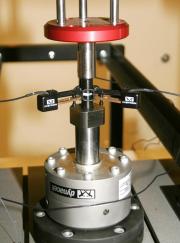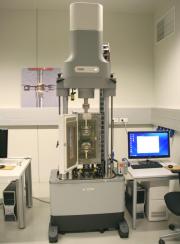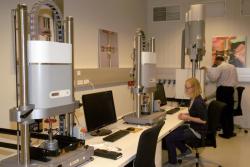Technical Report 2012-05-29
Content shown in the technical articles are the sole opinion and views of the authors or companies, which are not necessarily congruent to opinion and views of the editors.
|
Johannes Kepler University, Linz/Austria: IPMT Uses Three Instron Electrodynamic Testing Systems to Analyse Failure Properties of Polymers Erik Schmidt-Staubach, Instron Deutschland GmbH Undergraduate and post-graduate students at the Institute of Polymeric Materials and Testing (ipmt) at Johannes Kepler University (JKU) in Linz in Austria can rely on three Instron electrodynamic testing systems to help them analyse the failure behaviour of polymers. Two general-purpose ElectroPuls E3000 and a further ElectroPuls E10000 Linear-Torsion testing system designed for higher and biaxial loads have been set up in one of the numerous laboratories in the university´s Science Park, inaugurated in late 2011 and equipped with leading-edge testing and analysis equipment. Currently these machines are used predominantly for investigating the fracture mechanics of thermoplastic materials.  O.Univ.-Prof. Dipl.-Ing. Dr.mont. Reinhold W. Lang, Johannes Kepler University Linz, Institute of Polymeric Materials and Testing  ElectroPuls E3000 testing system used for fundamental research at JKU Linz: Can dynamic loading of a notched, round specimen provide an indication of the service life of a component?  Students at JKU Linz can rely on an ElectroPuls E10000 Linear-Torsion testing system with temperature chamber for performing fracture mechanics tests on high-strength polymers. Photos: Instron  In its laboratory in the new Science Park at Johannes Kepler University (JKU) in Linz/Austria, opened in late 2011, the department of Polymer Engineering and Technologies uses three Instron ElectroPuls electrodynamic testing systems to conduct fracture mechanics studies on thermoplastic materials. The Institute of Polymeric Materials and Testing (www.jku.at/ipmt) is one of the key institutes of the academic programmes Polymer Engineering (BSc), Polymer Science and Technologies (MSc), Management in Polymer Technologies (MSc) and Polymer Science and Technologies (PhD) at Johannes Kepler University, Linz/Austria, established in 2009. The Institute´s teaching and research responsibilities cover the fields of physics, material science, testing and applications of polymeric materials. The research profile of the institute focuses on some of the key technologies associated with the concept of Sustainable Development. It comprises research activities in the development of polymeric materials and the utilization of polymer technologies especially in the areas of water supply, renewable energies, light-weight designs for electrically driven vehicles. In addition the institute cooperates closely with partners from research and industry. Headed by Professor Lang as initiator and coordinator, the institute has contributes toward major joint research programmes. Instron (www.instron.de) is a globally leading manufacturer of test equipment for the material and structural testing markets. A global company providing single-source convenience, Instron manufactures and services products used to test the mechanical properties and performances of various materials, components and structures in a wide array of environments. Instron systems evaluate materials ranging from the most fragile filament to advanced high-strength alloys. With the combined experience of CEAST in designing plastic testing systems, Instron enhances materials testing offerings, providing customers with comprehensive solutions for all their research, quality and service-life testing requirements. Additionally, Instron offers a broad range of service capabilities, including assistance with laboratory management, calibration expertise and customer training. Instron GmbH Landwehrstrasse 65 Phone: +49 (0) 6151 3917 457 Internet: www.instron.com |
 back to the list back to the list |  back to top back to top |



